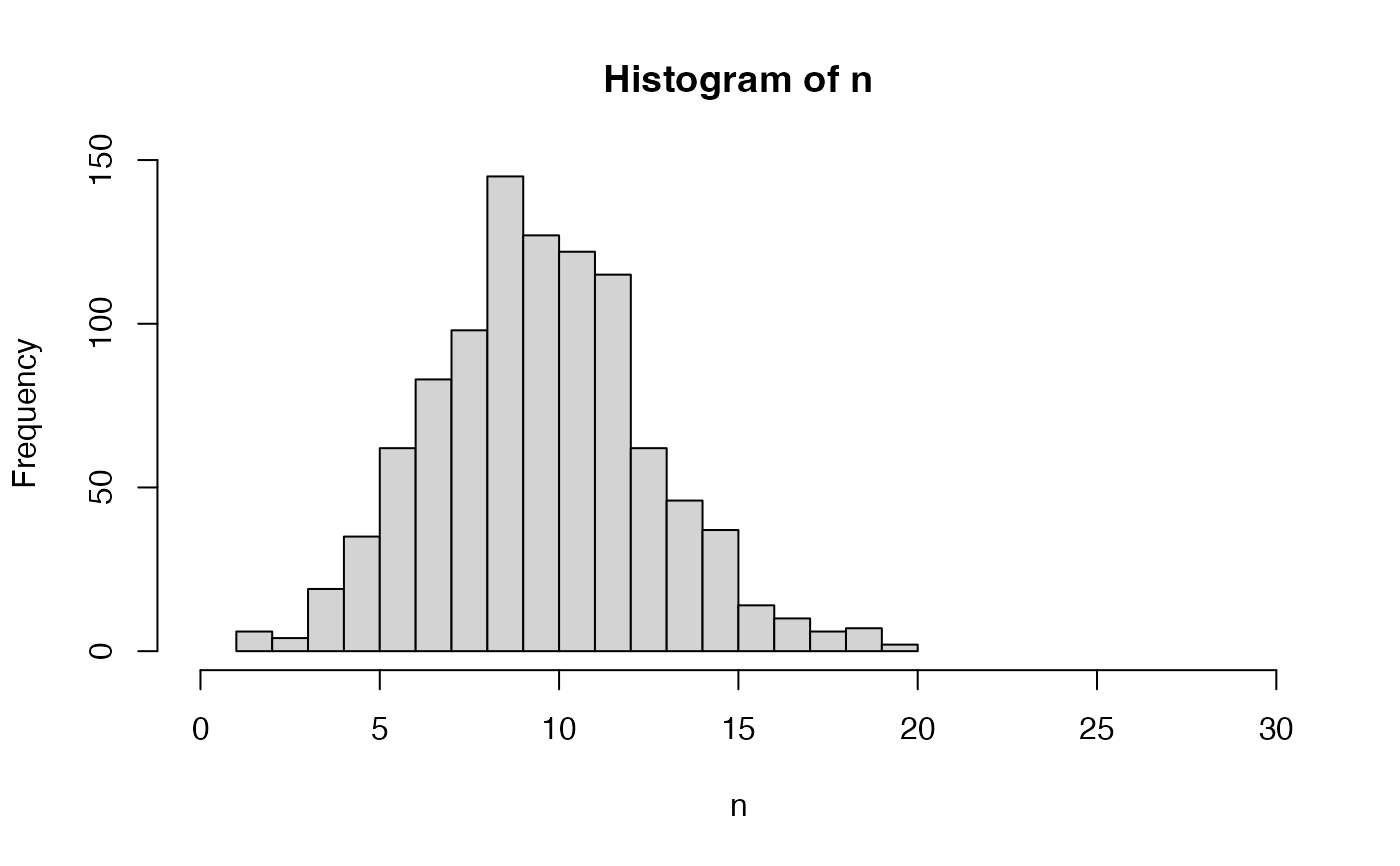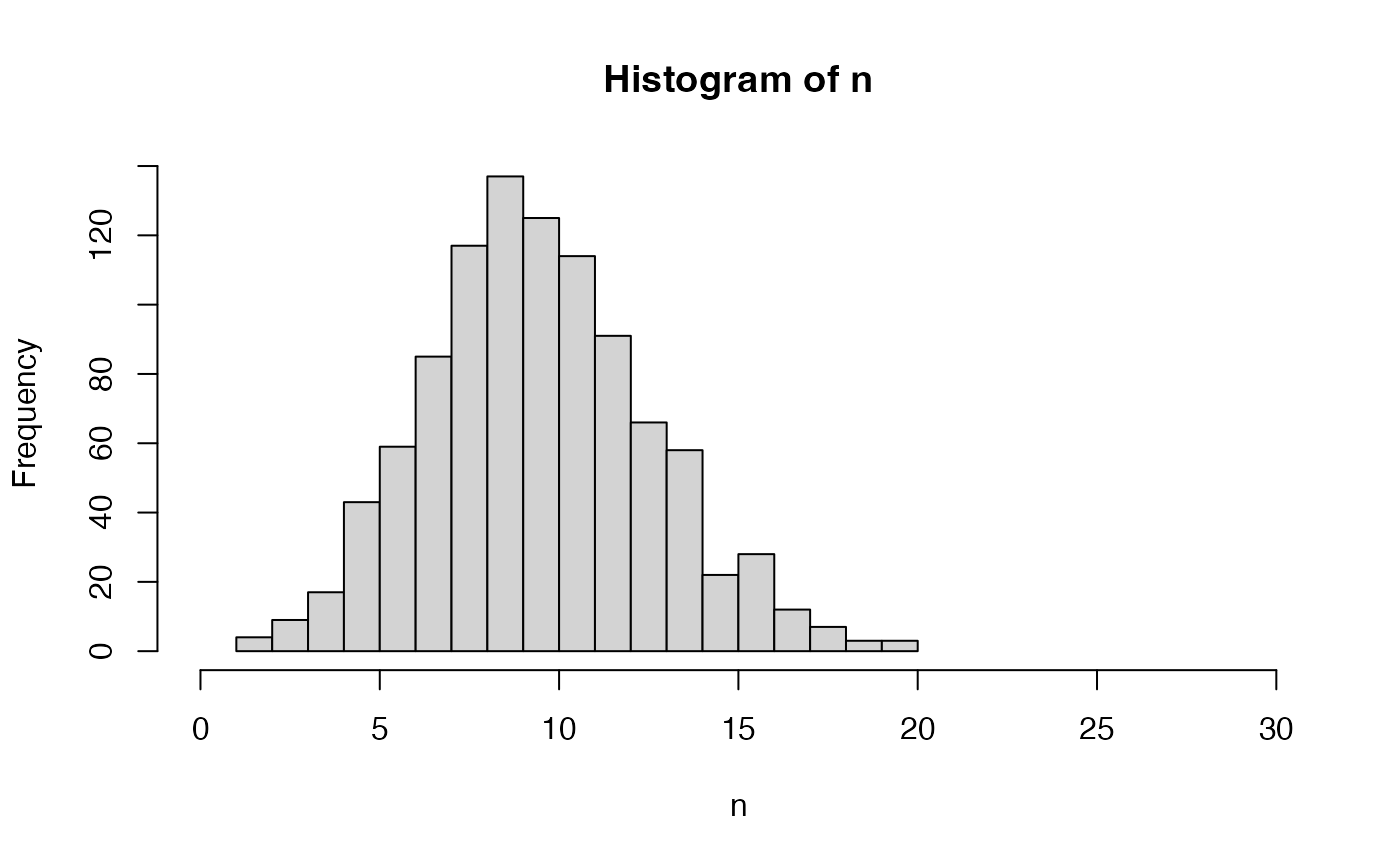Sample a number of virgin queens - used when
nFathers = NULL (see SimParamBee$nVirginQueens).
This is just an example. You can provide your own functions that satisfy your needs!
nVirginQueensPoisson(colony, n = 1, average = 10)
nVirginQueensTruncPoisson(colony, n = 1, average = 10, lowerLimit = 0)
nVirginQueensColonyPhenotype(
colony,
queenTrait = 1,
workersTrait = 2,
checkProduction = FALSE,
lowerLimit = 0,
...
)Arguments
- colony
- n
integer, number of samples
- average
numeric, average number of virgin queens
- lowerLimit
numeric, returned numbers will be above this value
- queenTrait
numeric (column position) or character (column name), trait that represents queen's effect on the colony phenotype (defined in
SimParamBee- see examples); ifNULLthen this effect is 0- workersTrait
numeric (column position) or character (column name), trait that represents workers's effect on the colony phenotype (defined in
SimParamBee- see examples); ifNULLthen this effect is 0- checkProduction
logical, does the phenotype depend on the production status of colony; if yes and production is not
TRUE, the result is abovelowerLimit- ...
other arguments of
mapCasteToColonyPheno
Value
numeric, number of virgin queens
Details
nVirginQueensPoisson samples from a Poisson distribution,
which can return a value 0 (that would mean a colony will fail to raise a
single virgin queen after the queen swarms or dies).
nVirginQueensTruncPoisson samples from a truncated Poisson
distribution (truncated at zero) to avoid failure.
nVirginQueensColonyPhenotype returns a number (above
lowerLimit) as a function of colony phenotype, say swarming
tendency. Colony phenotype is provided by
mapCasteToColonyPheno. You need to set up traits
influencing the colony phenotype and their parameters (mean and variances)
via SimParamBee (see examples).
Functions
nVirginQueensTruncPoisson(): Sample a non-zero number of virgin queensnVirginQueensColonyPhenotype(): Sample a non-zero number of virgin queens based on colony's phenotype, say, swarming tendency
See also
SimParamBee field nVirginQueens and
vignette(topic = "QuantitativeGenetics", package = "SIMplyBee")
Examples
nVirginQueensPoisson()
#> [1] 5
nVirginQueensPoisson()
#> [1] 24
n <- nVirginQueensPoisson(n = 1000)
hist(n, breaks = seq(from = min(n), to = max(n)), xlim = c(0, 30))
 table(n)
#> n
#> 1 2 3 4 5 6 7 8 9 10 11 12 13 14 15 16 17 18 19 20
#> 2 4 4 19 35 62 83 98 145 127 122 115 62 46 37 14 10 6 7 2
nVirginQueensTruncPoisson()
#> [1] 16
nVirginQueensTruncPoisson()
#> [1] 6
n <- nVirginQueensTruncPoisson(n = 1000)
hist(n, breaks = seq(from = min(n), to = max(n)), xlim = c(0, 30))
table(n)
#> n
#> 1 2 3 4 5 6 7 8 9 10 11 12 13 14 15 16 17 18 19 20
#> 2 4 4 19 35 62 83 98 145 127 122 115 62 46 37 14 10 6 7 2
nVirginQueensTruncPoisson()
#> [1] 16
nVirginQueensTruncPoisson()
#> [1] 6
n <- nVirginQueensTruncPoisson(n = 1000)
hist(n, breaks = seq(from = min(n), to = max(n)), xlim = c(0, 30))
 table(n)
#> n
#> 1 2 3 4 5 6 7 8 9 10 11 12 13 14 15 16 17 18 19 20
#> 1 3 9 17 43 59 85 117 137 125 114 91 66 58 22 28 12 7 3 3
# Example for nVirginQueensColonyPhenotype()
founderGenomes <- quickHaplo(nInd = 3, nChr = 1, segSites = 100)
SP <- SimParamBee$new(founderGenomes)
# Setting trait scale such that mean is 10 split into queen and workers effects
meanP <- c(5, 5 / SP$nWorkers)
# setup variances such that the total phenotype variance will match the mean
varA <- c(3 / 2, 3 / 2 / SP$nWorkers)
corA <- matrix(data = c(
1.0, -0.5,
-0.5, 1.0
), nrow = 2, byrow = TRUE)
varE <- c(7 / 2, 7 / 2 / SP$nWorkers)
varA / (varA + varE)
#> [1] 0.3 0.3
varP <- varA + varE
varP[1] + varP[2] * SP$nWorkers
#> [1] 10
SP$addTraitA(nQtlPerChr = 100, mean = meanP, var = varA, corA = corA)
SP$setVarE(varE = varE)
basePop <- createVirginQueens(founderGenomes)
#> Error in get(x = "SP", envir = .GlobalEnv): object 'SP' not found
drones <- createDrones(x = basePop[1], nInd = 50)
#> Error in get(x = "SP", envir = .GlobalEnv): object 'SP' not found
droneGroups <- pullDroneGroupsFromDCA(drones, n = 2, nDrones = 15)
#> Error in get(x = "SP", envir = .GlobalEnv): object 'SP' not found
colony1 <- createColony(x = basePop[2])
#> Error in get(x = "SP", envir = .GlobalEnv): object 'SP' not found
colony2 <- createColony(x = basePop[3])
#> Error in get(x = "SP", envir = .GlobalEnv): object 'SP' not found
colony1 <- cross(colony1, drones = droneGroups[[1]])
#> Error in get(x = "SP", envir = .GlobalEnv): object 'SP' not found
colony2 <- cross(colony2, drones = droneGroups[[2]])
#> Error in get(x = "SP", envir = .GlobalEnv): object 'SP' not found
colony1 <- buildUp(colony1)
#> Error in get(x = "SP", envir = .GlobalEnv): object 'SP' not found
colony2 <- buildUp(colony2)
#> Error in get(x = "SP", envir = .GlobalEnv): object 'SP' not found
nVirginQueensColonyPhenotype(colony1)
#> Error in get(x = "SP", envir = .GlobalEnv): object 'SP' not found
nVirginQueensColonyPhenotype(colony2)
#> Error in get(x = "SP", envir = .GlobalEnv): object 'SP' not found
table(n)
#> n
#> 1 2 3 4 5 6 7 8 9 10 11 12 13 14 15 16 17 18 19 20
#> 1 3 9 17 43 59 85 117 137 125 114 91 66 58 22 28 12 7 3 3
# Example for nVirginQueensColonyPhenotype()
founderGenomes <- quickHaplo(nInd = 3, nChr = 1, segSites = 100)
SP <- SimParamBee$new(founderGenomes)
# Setting trait scale such that mean is 10 split into queen and workers effects
meanP <- c(5, 5 / SP$nWorkers)
# setup variances such that the total phenotype variance will match the mean
varA <- c(3 / 2, 3 / 2 / SP$nWorkers)
corA <- matrix(data = c(
1.0, -0.5,
-0.5, 1.0
), nrow = 2, byrow = TRUE)
varE <- c(7 / 2, 7 / 2 / SP$nWorkers)
varA / (varA + varE)
#> [1] 0.3 0.3
varP <- varA + varE
varP[1] + varP[2] * SP$nWorkers
#> [1] 10
SP$addTraitA(nQtlPerChr = 100, mean = meanP, var = varA, corA = corA)
SP$setVarE(varE = varE)
basePop <- createVirginQueens(founderGenomes)
#> Error in get(x = "SP", envir = .GlobalEnv): object 'SP' not found
drones <- createDrones(x = basePop[1], nInd = 50)
#> Error in get(x = "SP", envir = .GlobalEnv): object 'SP' not found
droneGroups <- pullDroneGroupsFromDCA(drones, n = 2, nDrones = 15)
#> Error in get(x = "SP", envir = .GlobalEnv): object 'SP' not found
colony1 <- createColony(x = basePop[2])
#> Error in get(x = "SP", envir = .GlobalEnv): object 'SP' not found
colony2 <- createColony(x = basePop[3])
#> Error in get(x = "SP", envir = .GlobalEnv): object 'SP' not found
colony1 <- cross(colony1, drones = droneGroups[[1]])
#> Error in get(x = "SP", envir = .GlobalEnv): object 'SP' not found
colony2 <- cross(colony2, drones = droneGroups[[2]])
#> Error in get(x = "SP", envir = .GlobalEnv): object 'SP' not found
colony1 <- buildUp(colony1)
#> Error in get(x = "SP", envir = .GlobalEnv): object 'SP' not found
colony2 <- buildUp(colony2)
#> Error in get(x = "SP", envir = .GlobalEnv): object 'SP' not found
nVirginQueensColonyPhenotype(colony1)
#> Error in get(x = "SP", envir = .GlobalEnv): object 'SP' not found
nVirginQueensColonyPhenotype(colony2)
#> Error in get(x = "SP", envir = .GlobalEnv): object 'SP' not found